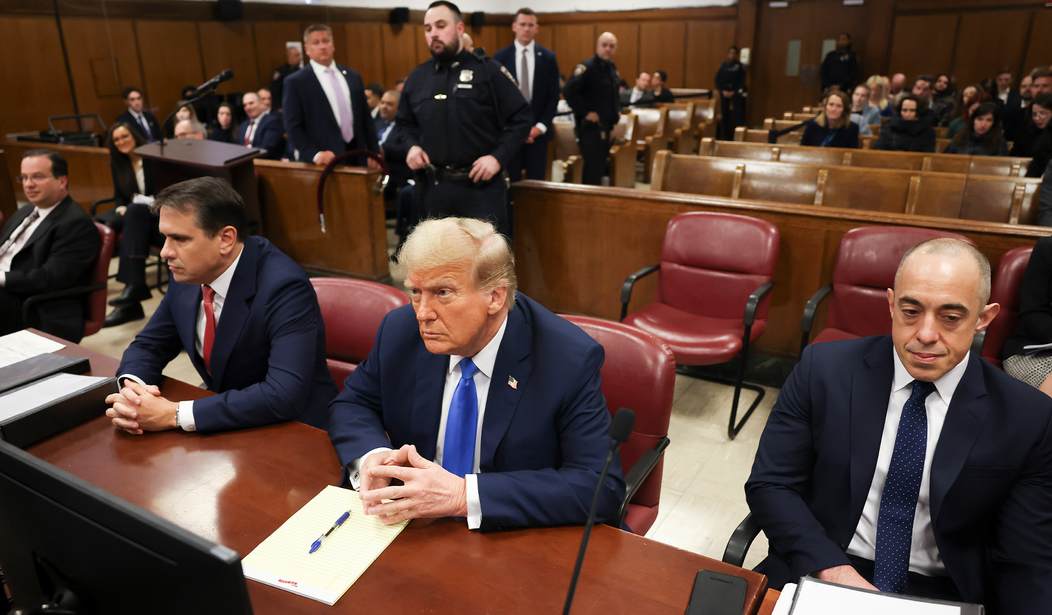Perhaps the weirdest, and by far the most unjust, thing about former President Donald Trump's trial in New York is that we do not know precisely what crime Trump is charged with committing. We're in the middle of the trial, with Trump facing a maximum of more than 100 years in prison, and we don't even know what the charges are! It's a surreal situation.
Yes, we know that Trump is charged with falsifying business records of payments made to the porn actress Stormy Daniels in 2016 and 2017. But falsifying business records is a misdemeanor with a two-year statute of limitations, meaning prosecutors would be prohibited from charging Trump with that crime after 2019, which was five years ago. They obviously missed that deadline by a mile.
We also know that New York law allows falsifying business records to be upgraded to a felony if the alleged falsification was done with "intent to defraud that includes an intent to commit another crime or to aid or conceal the commission thereof." In that case, the statute of limitations extends to five years, which would have allowed prosecutors to charge Trump as late as 2022. Prosecutors missed that deadline, too.
Trump was indicted in 2023. How did that happen? Because of COVID-19, when New York extended its statute of limitations by a year. That allowed prosecutors to slip the charges in right before the new, one-time-only, six-year extended statute of limitations expired.
But here's the thing: What was the "intent to commit another crime or aid and conceal the commission thereof" that prosecutors used to raise falsification of business records from a misdemeanor to a felony? In nearly every case of alleged falsification of records that has been charged as a felony in New York, the defendant was charged with another crime -- that is, prosecutors made it clear what the other crime was. In Trump's case, the indictment did not specify any other crime. Manhattan District Attorney Alvin Bragg said the law did not require him to specify the other crime.
Recommended
So Trump faced felony charges without knowing what he was accused of doing. And the really amazing thing is that the trial is now underway and Bragg has still not specified what the other crime is. It is a key element of the case. Without it, the charges against Trump could never have been brought because they were misdemeanors long past the statute of limitations. It is the other crime that makes this whole prosecution possible. But the prosecutor has not specified what it is.
If that sounds vaguely unconstitutional to you, you're right. As former federal prosecutor Andrew McCarthy points out, the Fifth Amendment "requires a felony charge to be spelled out in an indictment whose criminal elements have been established by probable cause to the satisfaction of a grand jury." The problem, McCarthy continues, is that the election-stealing conspiracy Bragg's prosecutors are accusing Trump of engaging in is "not charged in the indictment" and, further, "there is no such conspiracy crime in New York penal law." McCarthy also argues that the charges violate the New York Constitution.
McCarthy, of course, has been a vocal critic of Bragg's prosecution. However, even supporters of prosecuting Trump don't know what Trump is accused of. Just look at a recent column -- "Charting the Legal Theory Behind People v. Trump" -- from the aptly named Lawfare publication, which is published by the liberal Brookings Institution. (To give you an idea of Lawfare's perspective, back in the Robert Mueller investigation, its most prominent staffer staged a little celebration each time there was a new anti-Trump story that he deemed a bombshell.)
"When Manhattan District Attorney Alvin Bragg first brought charges against Donald Trump in March 2023, the legal theory behind the indictment remained remarkably unclear," Lawfare Senior Editor Quinta Jurecic wrote. "Now, a year later, with the trial finally underway ... the charges against Trump still have an oddly inchoate quality."
Jurecic argued that if you look in the right places, and can connect a few dots, you might be able to guess what law the prosecutors believe Trump broke. But the deeper she dug into it, the farther down in the weeds she got and the less definitive her answer became. Is Trump accused of breaking federal election law? Of breaking a New York law that makes it illegal to promote the election of a candidate "by unlawful means"? Of committing tax fraud? (That is perhaps the wildest theory, in which Trump might stand accused of conspiring to pay too much tax. Really.)
Struggling, Jurecic comes up with a diagram of possible Trump charges. Take a look and see if you can make any sense of it.
It's tempting to make fun of this. But it is not funny. If Trump is convicted on all 34 felony counts against him, the maximum sentence he would face is 136 years in prison. That's crazy in itself. But then there is the more fundamental insult to basic principles of justice in which the accused has a right to know the charges against him. It is the insanity at the heart of the Trump trial.
























Join the conversation as a VIP Member